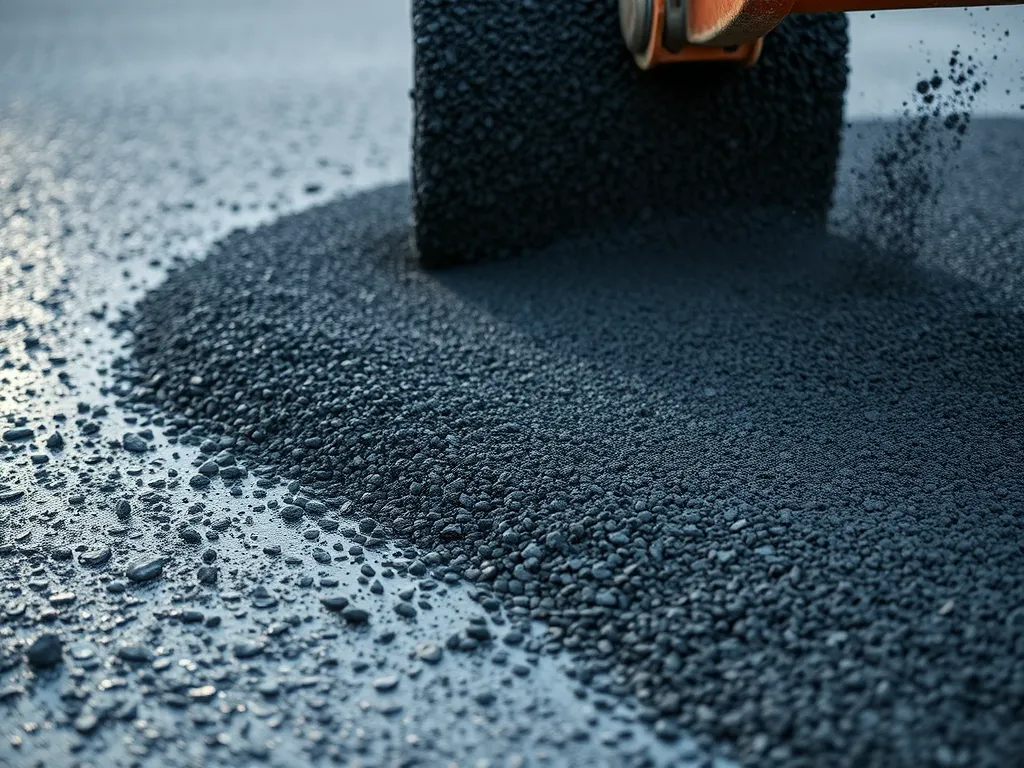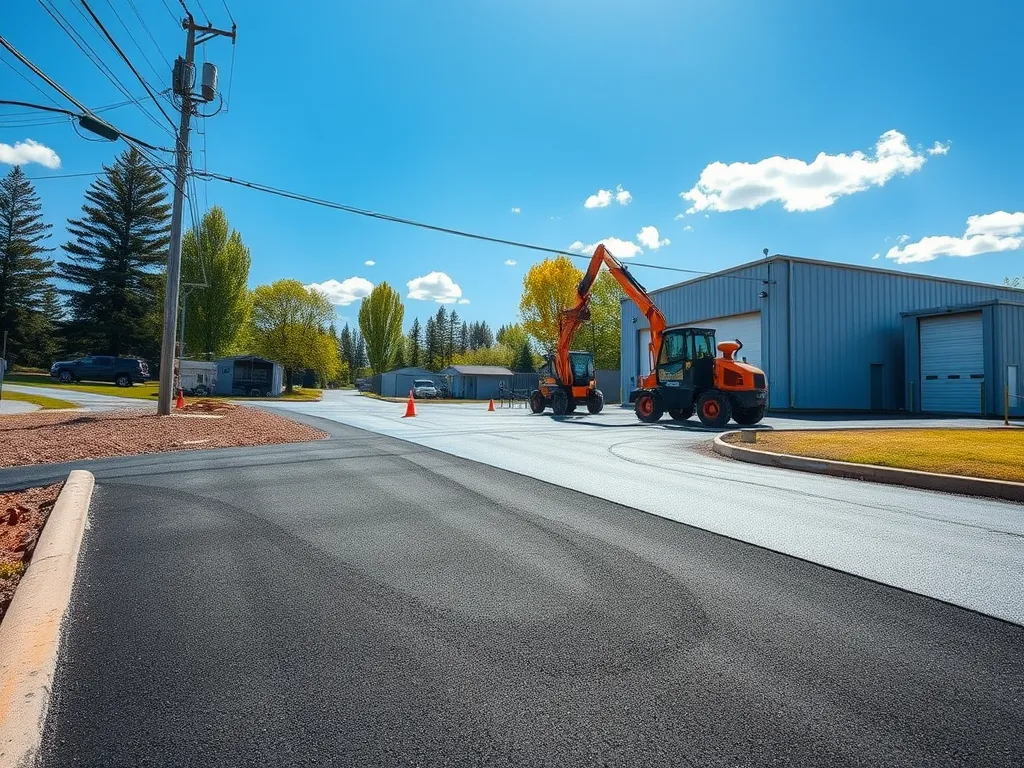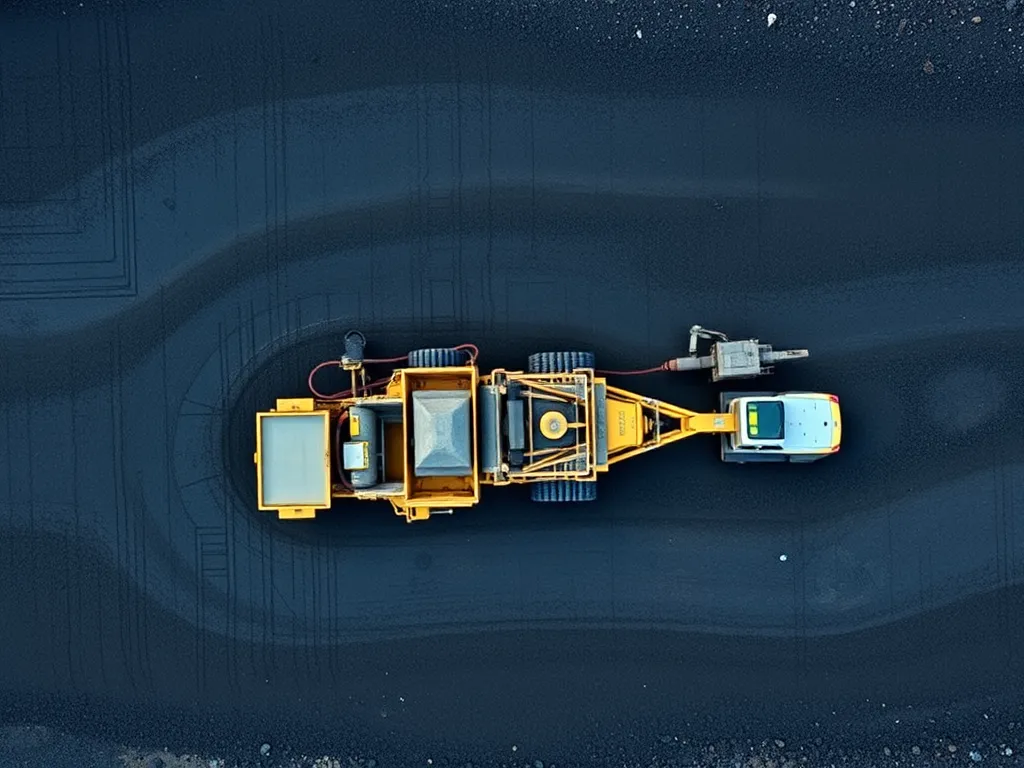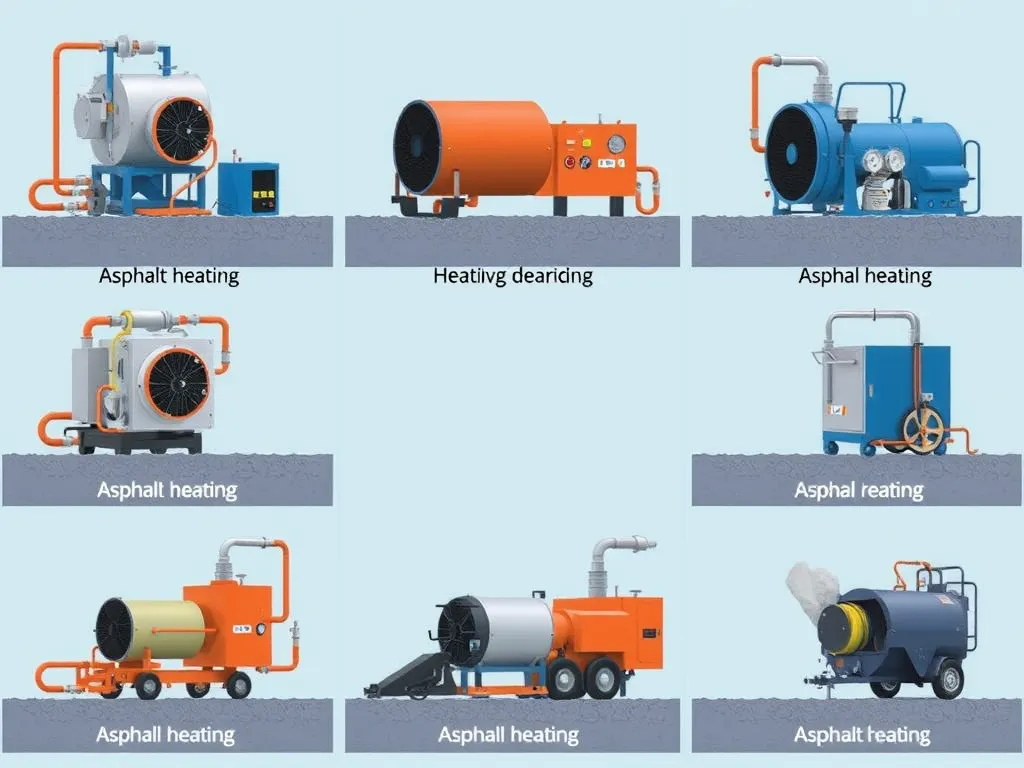DIY Asphalt Mastery: Your Complete Guide to Do It Yourself Asphalt Projects
Published on: November 18, 2025 | Last Updated: April 14, 2025
Written By: George Voss
Do it yourself asphalt lets homeowners tackle driveways and repairs using bagged cold mix or small hot mix batches. This approach uses hand tools like tampers and rakes instead of professional paving equipment. You’ll need crushed stone for the base layer, asphalt binder, and safety gear like work gloves and steel-toe boots. Projects done right can save 40-60% versus hiring contractors but demand precise measurements and daytime temperatures above 50°F for proper curing.
This guide walks through seven key areas: choosing between hot mix asphalt (HMA), cold patch, or warm mix asphalt (WMA) for different jobs; calculating materials using online asphalt calculators; prepping surfaces with proper grading techniques; patching potholes with rubberized sealants; maintaining surfaces through sealcoating; managing environmental impacts with permeable designs; and answering FAQs about costs. Learn hand-laying methods for small driveways, compare $3-$5 per sq ft DIY costs to $7-$12 professional rates, and follow EPA standards for recycling old pavement.
Contents
Understanding Asphalt Basics
Successful diy asphalt projects start with knowing your materials. Three asphalt types dominate home projects – each with distinct uses, costs, and handling requirements.
Types Of Asphalt for DIY Projects
Choosing the right mix determines project durability and ease. Let’s break down options available at suppliers like Home Depot or local asphalt plants.
Hot Mix Asphalt (HMA)
HMA arrives at 300-350°F for permanent surfaces like driveways. Requires rapid installation – cools to 175°F in 15 minutes. Ideal for diy asphalt driveway installations exceeding 100 sq ft. Costs $90-$130 per ton. Use PG 64-22 binders for most climates.
Cold Mix Asphalt for Repairs
Pre-mixed bags ($5-$15 per 50 lb) let you fix potholes or cracks without heating. Stays workable at 40°F+. Apply diy asphalt sealant over patches for water resistance. Compacts at 2,500-3,000 PSI with hand tampers.
Warm Mix Asphalt (WMA)
WMA uses additives like Sasobit to lower temps to 200-250°F. Rare for diy asphalt projects due to limited retail availability. Check local plants – some rent small pavers for WMA at $110-$150 per ton. Eco-friendly choice with 15% lower emissions than HMA.
| Mix Type | Temp Range | DIY Cost | Best For |
|---|---|---|---|
| HMA | 300-350°F | $90-$130/ton | Driveways |
| Cold Mix | Ambient | $5-$15/bag | Repairs |
| WMA | 200-250°F | $110-$150/ton | Eco builds |
With materials selected, precise planning ensures your diy asphalt driveway stays on budget and lasts 15-20 years. Next, we’ll map your project from measurements to mix quantities.
Planning Your DIY Asphalt Project
Proper preparation separates successful asphalt projects from costly mistakes. Measure twice, plan once.
Assessing Your Driveway or Repair Area
Start by measuring the square footage needing work. Use a tape measure for driveways: multiply length by width. For repairs, mark damaged zones with chalk. Check the base layer’s condition—cracks wider than ¼ inch or water pooling signal subgrade issues. A stable aggregate base prevents 80% of asphalt failures. Test drainage by pouring water on the surface; fix slopes below 2% grade.
Calculating Material Needs
Asphalt weighs 145 lbs per cubic foot. Most driveways need 2-3 inches of compacted material. Calculate volume with this formula: (Length x Width x Depth) / 27 = Cubic yards. Add 10% extra for compaction loss.
Using an Asphalt Calculator for Accurate Estimates
Plug your measurements into an asphalt calculator. For a 300 sq ft driveway at 3-inch depth: 300 x 0.25 = 75 cubic feet → 75/27 = 2.78 cubic yards. Hot mix asphalt (HMA) costs $100-$200 per ton delivered. Expect 1 ton to cover 40-80 sq ft at 2-inch thickness.
Budgeting for DIY Asphalt Costs
Typical DIY asphalt driveway projects run $2-$5 per sq ft. Compare that to $4-$8 per sq ft for professional work. Rent a plate compactor ($75/day) and drum roller ($300/day). Factor in sealcoating supplies: $0.15-$0.25 per sq ft annually.
Factors Affecting DIY Asphalt Pricing
Local aggregate prices swing material costs by 30%. Cold patch asphalt runs $35-$50 per 50-lb bag but lasts 1-3 years versus HMA’s 15-20 year lifespan. Delivery fees add $50-$150 for loads under 10 tons. Geographic location matters—Midwest asphalt prices average 12% lower than coastal regions.
Ready to get your hands dirty? The next phase covers laying techniques that make or break your surface.

Step-by-step Asphalt Installation
Turning raw materials into lasting pavement demands careful work. Follow this guide for strong results on your diy asphalt project.
Preparing the Base Surface
A solid foundation supports 80% of pavement performance. Start by digging 8-12 inches below finish grade, removing soft soil. Add 4-6 inches of crushed stone (3/4″ angular aggregate works best) as your subbase.
Grading and Compaction Techniques
Slope surfaces at 2% minimum for drainage. Use a 10-ft level to check grade. Compact in 2″ layers with a plate compactor (rental: $65/day). Aim for 95% Proctor density—test by walking on soil; footprints should barely show.
| Layer | Material | Thickness |
|---|---|---|
| Subgrade | Native soil | 8-12″ |
| Subbase | Crushed stone | 4-6″ |
| Base | Dense-grade aggregate | 2-4″ |
Laying Asphalt by Hand
Hot mix asphalt (HMA) stays workable for 15-30 minutes in 70°F weather. Spread with a lute or aluminum rake at 2-3″ thickness. Work from downslope to upslope to avoid stepping on fresh mat.
Spreading and Compacting Methods
Maintain 275°F mix temp for optimal workability. Compact within 10 minutes using a hand tamper (for small patches) or gas-powered roller (driveways). Make 3-5 passes, starting at edges. Final density should hit 92-95% of lab targets.
DIY Asphalt Driveway Installation
A 20×20 ft diy asphalt driveway needs 6-8 tons of HMA ($90-$130/ton). Pour in 4 ft wide strips. Butt joints tightly—gaps over 1/4″ will crack within a year. Seal joints with AC-30 binder applied at 0.25 gal/sq yd. Allow 24-48 hours curing before driving on it.
Skilled handwork cuts labor costs by 60% vs hiring pros, but demands physical stamina. For projects spanning 200+ sq ft, think about team help or machinery rental.
Solid installation stops many issues, but all pavements face wear. Next: fixing cracks and holes that pop up through years of use.
Also See: Can You Heat Cold Patch Asphalt? Get Better Results
Common DIY Asphalt Repairs
Handling small fixes early saves time and money. Tackle these common issues with basic tools and materials.
Filling Cracks With DIY Asphalt Sealant
Hairline cracks under 1/4 inch need liquid fillers. Use a pour-and-go rubberized asphalt sealant for gaps up to 1/2 inch. Clean debris first with a wire brush or leaf blower. Apply in dry weather above 50°F for proper curing. For larger splits, pack sand halfway before sealing.
Patching Potholes With Cold Mix Asphalt
Bagged cold mix asphalt bonds without heating. Remove loose chunks and level the base. Fill holes 2 inches deep in 1-inch layers. Compact each layer with a hand tamper (25+ pounds force). One 50-pound bag covers 6-8 small holes. Costs run $12-$18 per bag at hardware stores.
Resealing Driveway Surfaces
Seal every 2-3 years to block water damage. Use squeegee kits or spray systems for thin, even coats. Wait 24-48 hours before driving. Coverage: 1 gallon per 50 sq ft. Apply in 60°F+ weather with no rain for 24 hours.
Choosing the Right DIY Sealcoating Products
Pick coal-tar (longer wear) or asphalt-based (eco-friendly) sealers. Check labels for 25-35% solids content. Add sand (1 cup per gallon) for slip resistance. Avoid thin, watery mixes – they crack faster. Top brands like Sakrete or Latex-ite cost $18-$35 per 5-gallon pail.
Mastering these fixes keeps surfaces smooth. Now let’s explore how to make repairs last through smart upkeep.

Essential Maintenance for DIY Asphalt
Preserve your hard work with smart maintenance strategies. Proper care extends asphalt lifespan from 15 to 30 years while preventing costly repairs.
Sealcoating Schedule for Longevity
Apply DIY asphalt sealcoating every 2-3 years using acrylic or coal-tar emulsions. Time applications when temperatures stay above 50°F for 48 hours. A standard driveway (600 sq ft) needs 5-7 gallons costing $0.15-$0.25 per square foot. Use squeegees or spray systems for even coverage.
Crack Prevention Strategies
Treat cracks wider than 1/8″ immediately with rubberized asphalt emulsion. For DIY asphalt filling, choose cold-pour sealants in cartridges for gaps under 1/2″ or hot-applied compounds for larger fissures. Winter freeze-thaw cycles accelerate damage – inspect surfaces each spring and fall.
Cleaning and Surface Care
Remove oil stains within 48 hours using trisodium phosphate degreasers. Pressure wash at 1,500-2,000 PSI annually to clear debris from joints. Avoid metal scrapers – plastic blades prevent surface scoring. For diy asphalt driveway resealing prep, etch surfaces with mild acid cleaners (1 part muriatic acid to 10 parts water) before reapplying sealants.
Mastering these techniques keeps surfaces functional while protecting your investment. Next, explore sustainable practices that align asphalt care with environmental stewardship.
Environmental Considerations in DIY Asphalt
DIY asphalt projects need smart earth care. Follow these steps to cut harm while fixing roads or driveways.
Eco-friendly Material Handling
Manage leftovers right. Asphalt chunks and old mix can pollute soil if dumped. Reuse millings in new patches or base layers. Cold mix cans left open? Seal tight to stop oil leaks.
- Recycle 95% of old asphalt in new mixes
- Store cold mix under 80°F to keep oils stable
- Use exact amounts – extra asphalt harms local plants
Plan your diy asphalt project with a calculator to buy just what’s needed. One ton covers 40 sq ft at 2-inch depth.
Runoff Management Techniques
Fresh asphalt sheds water fast. Stop floods by shaping edges to guide flow. Slope your diy asphalt driveway 2% away from homes.
- Add gravel strips next to paved areas
- Use porous asphalt for small repair zones
- Plant grass swales to trap dirty runoff
Pick plant-based sealants with under 50 grams per liter of VOCs. These cuts air toxins by 60% vs standard options.
Ready to tackle common roadblocks? Our FAQ section breaks down costs, methods, and expert tips for your next move.

DIY Asphalt FAQ
What is the Cheapest Driveway Option?
The cheapest option for a driveway typically involves using cold mix asphalt for repairs or a gravel surface as a temporary solution. Cold mix asphalt creates an affordable patch for potholes, while gravel is the most budget-friendly, though it may require more maintenance over time.
Cost Of a 20×20 DIY Asphalt Driveway
For a 20×20 ft DIY asphalt driveway, you will likely need around 6-8 tons of hot mix asphalt, costing approximately $90 to $130 per ton. Overall, the total cost may range between $540 to $1,040, depending on local prices and material availability.
Repair Cost Comparison: DIY Vs Professional
When comparing costs, DIY asphalt repairs generally range from $2 to $5 per square foot, while hiring a professional typically costs between $7 and $12 per square foot. DIY can save homeowners 40-60% on labor costs, but it requires proper tools and techniques to ensure a durable finish.
Hand-laying Asphalt Techniques Explained
Hand-laying asphalt involves spreading hot mix using tools like a lute or rake, maintaining the proper thickness and temperature. It’s crucial to compact the asphalt quickly after laying it, using a hand tamper or roller to achieve the desired density and prevent future issues.
Using Asphalt Calculators Effectively
Asphalt calculators help estimate material needs by inputting the length, width, and depth of your project area. This tool reduces material waste and cost by ensuring accurate measurements, allowing for more efficient planning and execution of your DIY asphalt project.
Closing Thoughts
Embarking on a DIY asphalt project can be rewarding and cost-effective. With the right knowledge, materials, and techniques, homeowners can achieve professional-quality results.
Remember to start with proper planning. Assess your area, calculate the necessary materials using tools like Asphalt Calculator USA, and set a realistic budget. As you work through your project, focus on proper installation methods, maintenance, and eco-friendly practices.
For more information on asphalt projects, tips, and resources, visit Asphalt Calculator USA. Your journey to mastering DIY asphalt begins with the right support and knowledge!
Additional Resources for You:
- Huang, Y. H. (2004). Pavement Analysis and Design (2nd ed.). Upper Saddle River, NJ: Pearson/Prentice Hall.
- How to Replace your Entire Driveway (Complete Tear Out and Repave) – YouTube
- Do it yourself Asphalt Driveway – YouTube
- How to make homemade asphalt for paving a driveway – Quora
- Starting to feel ripped off with new asphalt driveway, what …


